How London fell back in love with the brasserie
From Brasserie Zédel to Café François, we sample the best bistros in town
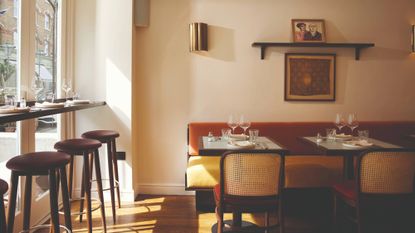
The traditional brasserie is something of a public good – a semi-formal, boisterous dining room serving a consistent menu of Mitteleuropean classics, from the first café au lait of the morning to the last petits fours of the night. Pop by for a glass of Sancerre and a plate of cheese, or settle in for a meaty four-hour lunch – for the patron, it makes no difference.
Paris' Brasserie Lipp is the perfect example. Founded in 1880 by Léonard Lipp, a restaurateur fleeing the German occupation of Alsace-Lorraine, it has served the denizens of Saint-Germain-des-Prés (and a good many who are not) for almost 150 years, and is still one of the best lunches in the city.
Expect fleet-footed waiters in stiff collars, paper tablecloths, pichets of decent house wine, and poulet rôti. (The word "brasserie" actually means brewery, and the first 'brasseries' were established as dining rooms attached to breweries in France's Alsace region, where 60 per cent of the country's beer is still made.)
Subscribe to The Week
Escape your echo chamber. Get the facts behind the news, plus analysis from multiple perspectives.

Sign up for The Week's Free Newsletters
From our morning news briefing to a weekly Good News Newsletter, get the best of The Week delivered directly to your inbox.
From our morning news briefing to a weekly Good News Newsletter, get the best of The Week delivered directly to your inbox.

At Joséphine Bouchon on Fulham Road, Michelin-starred chef Claude Bosi offers a menu inspired by his home town of Lyon
In London, the traditional format is perhaps best represented by Brasserie Zédel – a brilliantly loving tribute to Paris' great brasseries of old – which opened on the site of the former Regent Palace Hotel off Leicester Square in 2012. To this day, diners flock in their droves to enjoy the vast Belle Époque dining room (which formerly served as the Atlantic Bar & Grill), its mastery of steak haché and a remarkably cheap prix fixe menu.
Head down Piccadilly and you'll find Brasserie Zédel's sibling, The Wolseley, an all-day grand café in the Viennese style opened in 2003, which for a long time remained the coolest dining spot in town – it was impossible to visit and not see a bold-face name demolishing a chopped salad or coming up short against a Frisbee-sized schnitzel.
Or venture up the Strand to The Delaunay, opened in 2011 (same group, different métier), which is much the same, though slightly moodier. All three were founded by Chris Corbin and Jeremy King, the pioneering restaurateur duo who dual-handedly defined London's restaurant scene for a decades-long stint split by the millennium.
In 2022, Corbin and King were ousted from their eponymous empire after losing a bidding war to buy the business out of administration, but 2024 marks the latter's triumphant return to the London scene. He has already opened Arlington in St James's, which is essentially Le Caprice – the duo's first ever restaurant and a legendary hangout of royals and rock stars alike – under a different name.
Next came The Park in Bayswater, a contemporary grand café with a European/Californian influence, and soon King will turn his Midas touch to Simpson's in the Strand, a woodpanelled dining room founded in 1828 and famed for joints of meat carved tableside. King told The Times that it will reopen as a "big-theatre brasserie" that makes diners feel like they've gone back in time. Sounds like he's right on the money.
Over the past few years, though, London's brasseries have had to jostle for relevance in a wave of "modern European" menus, small plates, unreserved seating and sharing concepts, as well as a resurgent love for the neighbourhood wine bar, such as Newington Green's Cadet and Camberwell's Little Cellars.
However, as the rising cost of living pinches ever harder, a desire for value, ease and comfort has materialised, allowing the brasserie's star to rise once again. And better yet, it is evolving, with a slew of new openings that underscore the appeal of the bistro's ability to deliver on the kinder, simpler side of dining.
When it opens in the autumn, Café François, a new all-day spot in London's Borough Market, will be a lower-key offshoot of Maison François in St James's, with a dedicated deli counter and bakery, and a menu serving whole chickens, prime ribs, salads, even Vietnamese bánh mì.
Searching for inspiration for Café François, restaurateur François O'Neill didn't pop over to Paris or nip down for a long weekend in Lyon, but instead headed west. "We travelled to Montreal, Los Angeles and San Francisco to experience a lot of different ideas," he tells The Blend, "downloading" various tidbits that could be collated on a menu that takes its cues from France's culinary diaspora, rather than the mores of its grand historical kitchens.
Whereas O'Neill describes Maison François as "brasserie luxe" – "slightly elevated, you go in for an experience" – he says that Café François is going to be "democratic, accessible, where people come for easy food. I think there's been a lack of that." In Fitzrovia, new restaurant July operates with the same energy, albeit on a smaller scale. "For me, [a brasserie represents] warmth and casualness, but not at the expense of quality," says July's co-founder Solynka Dumas, a food writer.
The concise weekday menu is flecked with European classics that pay homage to the Franco-German roots of Dumas and her partner, Julian Oschmann – deep-fried Munster, anyone? – but at the weekend it offers a simple whole roast chicken with mayonnaise, salad, pink fir potatoes, and baby leeks with tarragon and Riesling. Has a menu ever offered such succour?
In Covent Garden, Jackson Boxer, one of London's most prominent chefs and the co-founder of a number of the city's best-loved dining rooms, has just opened Henri, a Parisian-style bistro within The Henrietta hotel. Boxer, who laments the creep of chain restaurants in the area, says the menu is "playfully rooted in tradition and the wonderfully classical French culinary canon", noting how Parisian hospitality never fails to delight. "I can't wait to play a part in bringing a taste of this to central London," he adds.
The menu at Henri skews Gallic, but tends to focus on British makers and suppliers. Baguettes, for example, are by Dalston's The Dusty Knuckle bakery, and the bavette steak comes not from French cattle, but from Swaledale Butchers' heritage breeds in Yorkshire.
The all-day-dining love-in continues at Holland Park's resurgent brasserie, Julie's. Much like Le Caprice, throughout the latter stages of the 20th century it was very much the place to be for monied bohemians – Mick Jagger was a regular and one table was famously scarred by Tina Turner's dancing heels – but it was forced to close last year after 53 years of raucous business.
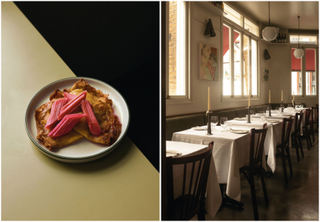
A tempting dish at new Fitzrovia opening July; elegant décor at Bistro Freddie in Shoreditch
However, it seems you can't keep a good brasserie down, especially one as saucy as Julie's. Under the stewardship of new owner Tara MacBain – a Holland Park local and debutante restaurateur – and chef-patron Owen Kenworthy, the décor is cosy, the cocktails are toothsome and the menu features riffs on French classics including lobster soufflé, tête de veau carpaccio and eggs mollet.
London is enjoying a wider casual-French resurgence, too, visible in the success of Shoreditch's Bistro Freddie, Clerkenwell's Bouchon Racine, Chelsea's Joséphine Bouchon and Borough Market's Camille. And a number of London's most formal Michelin-starred restaurants have been forced to close – Michel Roux Jr's Le Gavroche was perhaps the most notable case, but Galvin at Windows and Marcus at The Berkeley (by Marcus Wareing) both fed their last customers in the past few months, with Jason Atherton's Pollen Street Social set to follow suit this month.
O'Neill feels he knows why. "I hate to see them go," he says, "but it's a hard city, hard business." And expensive, chef-led menus are losing appeal: "I think people gravitate to things they know, feel confident about."
Sign up for Today's Best Articles in your inbox
A free daily email with the biggest news stories of the day – and the best features from TheWeek.com
Charlie Teasdale is Words & Pictures Editor-at-large at Esquire
-
 Funeral in Berlin: Scholz pulls the plug on his coalition
Funeral in Berlin: Scholz pulls the plug on his coalitionTalking Point In the midst of Germany's economic crisis, the 'traffic-light' coalition comes to a 'ignoble end'
By The Week UK Published
-
 Joe Biden's legacy: economically strong, politically disastrous
Joe Biden's legacy: economically strong, politically disastrousIn Depth The President boosted industry and employment, but 'Bidenomics' proved ineffective to winning the elections
By The Week UK Published
-
 Crossword: November 17, 2024
Crossword: November 17, 2024The Week's daily crossword
By The Week Staff Published
-
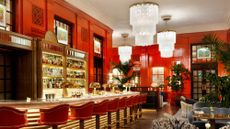 Raise your glass at these 7 hotel bars where the vibe is as important as the drinking
Raise your glass at these 7 hotel bars where the vibe is as important as the drinkingThe Week Recommends Have a pisco sour in Peru and a Bellini in Rome. Or maybe run into Bruno Mars in Vegas.
By Catherine Garcia, The Week US Published
-
 Love design? These hotels are ready to startle your eyes and drop your jaw.
Love design? These hotels are ready to startle your eyes and drop your jaw.The Week Recommends A treasure trove of curios and resplendent decor await
By Catherine Garcia, The Week US Published
-
 Why a Michelin star can spell danger for restaurants
Why a Michelin star can spell danger for restaurantsIn the Spotlight Winning chefs face heightened financial pressures, changing customer demands and professional limitations
By Harriet Marsden, The Week UK Published
-
 6 immersive experiences that bend reality
6 immersive experiences that bend realityThe Week Recommends Take a journey into the fantastic
By Catherine Garcia, The Week US Published
-
 Battersea Power Station: trip to the top
Battersea Power Station: trip to the topThe Week Recommends Head high for a bird's-eye view of the award-winning redevelopment of this landmark building – and views over London
By Adrienne Wyper, The Week UK Published
-
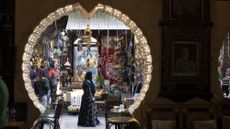 6 bustling outdoor markets ripe for exploration
6 bustling outdoor markets ripe for explorationThe Week Recommends These lively markets offer shopping with a side of culture
By Catherine Garcia, The Week US Published
-
 Banksy's animal art: method to the mystery?
Banksy's animal art: method to the mystery?In the Spotlight Elusive artist's daily series in London sparks joy – and widespread speculation about its meaning
By Harriet Marsden, The Week UK Published
-
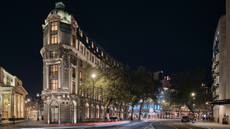 One Aldwych: where London's creative spirit takes centre stage
One Aldwych: where London's creative spirit takes centre stageThe Week Recommends This five-star Covent Garden hotel is the epitome of elegant independence
By Julia O'Driscoll, The Week UK Published